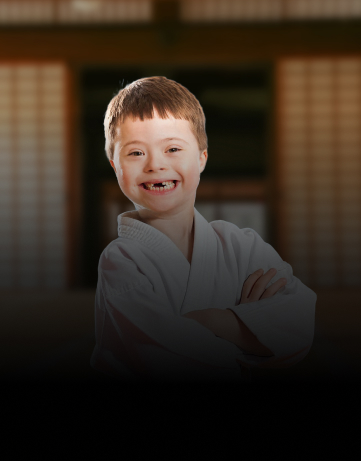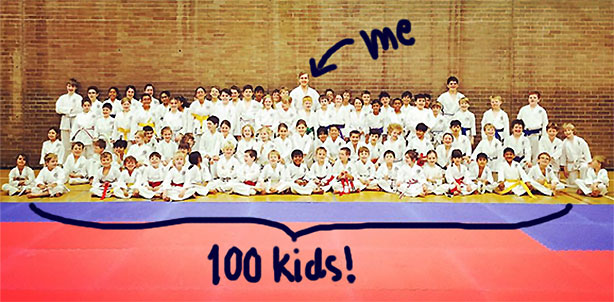Just How Martial Arts for Kids Can Boost Confidence and Discipline in Young Martial Artists
Karate for youngsters provides a special opportunity to construct self-confidence and technique in young martial artists. As they find out new strategies and face obstacles, they not just gain abilities however also establish a solid feeling of self-regard. This organized environment encourages them to value the journey of improvement. But exactly how does this training translate right into their daily lives? Discover the much deeper links that make karate more than simply a sport.
The Relevance of Confidence in Youth Development
Confidence is a vital structure block in youth advancement. When you nurture your kid's self-confidence, you empower them to deal with challenges, take threats, and reveal themselves openly. Kids with self-confidence are extra willing to explore new tasks and social circumstances, which can cause long-term friendships and useful experiences.Encouraging your child to get out of their comfort zone cultivates resilience. They find out that failure isn't the end but rather a stepping stone to success. By commemorating their achievements, no issue exactly how small, you help them recognize their capabilities and worth.In this trip, support and positive support from you play a vital duty. Whether it's with praise or merely existing, your involvement increases their confidence. As they expand, this confidence becomes a long-lasting possession, equipping them to browse both difficulties and possibilities with a strong feeling of self.
Exactly How Karate Educates Self-control and Emphasis
Karate helps you develop discipline and emphasis through its organized training regimen. As you exercise mindfulness during each session, you'll find out to focus much better both on and off the floor covering. Plus, establishing and accomplishing objectives in karate reinforces your capacity to stay dedicated and conscientious.
Structured Training Routine
While you take part in karate training, you'll promptly find just how a structured routine instills technique and focus in young experts. Each course follows a certain format, including workouts, technique practice, and sparring. This uniformity instructs you to dedicate and value the process to enhancement. As you find out types and strategies, you develop a sense of obligation for your very own progress.The organized environment motivates you to set objectives, whether mastering a new belt or perfecting a kata. You'll find that staying concentrated throughout drills and classes hones your focus. The technique you cultivate in karate extends beyond the dojo, positively influencing your schoolwork and everyday regimens. Each session enhances the relevance of dedication, assisting you expand into an extra self-displined person.
Mindfulness in Practice
As you exercise karate, you'll discover that mindfulness ends up being an important part of your training. Each relocation requires your complete focus, aiding you remain concentrated on the here and now minute. You'll discover to ignore diversions and focus on your breathing, activities, and purposes. This enhanced understanding hones your reflexes and improves your discipline.During sparring or forms, you'll discover the value of being emotionally present - Karate Salisbury MD. You'll observe how this emphasis not just enhances your method however likewise builds your confidence. By exercising mindfulness in martial arts, you cultivate patience and resilience, important qualities that extend beyond the dojo. By doing this, martial arts shows you to harness your mind, assisting you develop a disciplined strategy to obstacles both on and off the floor covering

Objective Setup Techniques
Setting goals in martial arts isn't nearly earning belts; it's a powerful means to cultivate self-control and focus. When you set details, attainable targets, you develop a roadmap for your progress. As an example, instead of just aiming to boost your kicks, try concentrating on grasping a certain technique monthly. This technique maintains you determined and engaged.Breaking down bigger objectives into smaller sized, convenient actions aids you track your progression and commemorate tiny victories in the process. Whether it's improving your stance or boosting your sparring endurance, every goal enhances your dedication. As you accomplish these goals, you'll develop confidence in your skills and create a strong sense of self-control that prolongs past the dojo into everyday life.
Structure Durability Through Martial Arts
Fighting style, particularly martial arts, uses children an unique possibility to construct resilience in an encouraging setting. In courses, they encounter challenges that push their limitations, whether it's grasping a new technique or competing with a partner. Each problem, like a missed kick or a lost suit, comes to be an opportunity to discover and grow.As they exercise, kids learn to accept discomfort and keep trying, read here also when points get difficult. They discover that failing isn't completion; it's part of the journey. This attitude helps them get better stronger, not just in the dojo, yet in daily life.With each difficulty they conquer, your child constructs self-confidence in their capability to tackle obstacles, sustaining their decision. Through karate, they'll recognize that durability isn't practically physical stamina; it has to do with mental grit and willpower, equipping them to face whatever life tosses their method.
The Function of Respect in Martial Arts Training
Respect is a fundamental principle in karate training, cultivating a culture of discipline and sociability among students. When you tip onto the dojo floor, you're not simply discovering methods; you're also learning to respect your teachers, peers, and the art itself (Karate Salisbury MD). Bowing at the beginning and end of class isn't simply a procedure; it represents your acknowledgment of others' dedication.as and efforts you establish common respect, you'll find it boosts your discovering experience. You'll listen more diligently to your instructor and gain understandings from fellow trainees. This setting motivates constructive objection and support, permitting everyone to grow together.Moreover, respect grows self-discipline. Identifying the worth of effort and humility aids you remain focused on your training. Consequently, this respect translates into your day-to-day life, boosting your interactions and connections outside the dojo. Through martial arts, you find out that respect is important for individual growth and community building
Establishing Objectives and Accomplishing Success in Martial arts

Social Skills and Teamwork in the Dojo
While training in the dojo, children normally establish essential social abilities and team effort capabilities. As they practice along with peers, they discover to interact effectively, share space, and assistance each other. Each course provides chances for collaboration, whether it's throughout partner drills or group workouts. This team effort fosters relationships and develops a feeling of belonging, basics making the dojo a nurturing environment.Kids likewise get important dispute resolution skills. When they experience difficulties, such as disputes during sparring, they discover to browse these scenarios constructively. They exercise perseverance and compassion, understanding that everybody has different strengths and weaknesses.Moreover, joining group tasks grows a feeling of responsibility. You'll see your youngster learning to depend on colleagues and take duty for their duty in a team. These experiences not just enhance their martial arts trip however additionally outfit them with social devices they'll carry into other areas of life.

The Long-Term Advantages of Karate Beyond Childhood
As youngsters mature and move right into the adult years, the benefits of karate prolong much beyond the dojo. You'll find that the technique and focus discovered with martial arts can equate right into your professional and scholastic life. Establishing and achieving goals in fighting styles promotes a solid job principles, which can press you to master any endeavor.Moreover, the confidence acquired from understanding methods and sparring can boost your self-esteem, aiding you take on difficulties head-on. This durability becomes indispensable as you face the uncertainties of adulthood.Additionally, the social abilities created with synergy and friendship in the dojo can lead to much better relationships in both individual and expert balls. You'll learn to communicate efficiently, resolve conflicts, and build a supportive network.Ultimately, karate forms not simply knowledgeable martial musicians, yet all-round individuals ready to take on the globe.
Regularly Asked Concerns
What Age Is Finest to Start Martial Arts for Kids?
You can begin martial arts as early as age four or 5, however it typically depends upon your child's maturation and passion. Discovering a class that matches their age and power level makes a big distinction.
Are There Any Health And Wellness Conveniences From Exercising Martial Arts?
Yes, practicing karate offers countless health and wellness benefits. You'll boost your sychronisation, strength, and adaptability while increasing cardio health and fitness. Plus, it improves emphasis and psychological wellness, making it an amazing selection for general physical and mental health.
Just How Typically Should Kids Participate In Karate Courses?
You ought to encourage your children to go to karate classes at the very least 2 to 3 times a week. Consistency aids them learn methods efficiently and create skills, making their experience a lot more satisfying and enjoyable in the future.
Can Karate Assist With Handling Stress And Anxiety in Kid?
Yes, martial arts can assist manage anxiousness in children. It educates focus and self-constraint while supplying a secure outlet for power. You'll observe your child expanding much more certain and calm as they practice routinely.
What Equipment Is Required for Children Beginning Martial Arts?

Comments on “Legacy Martial Arts – Experience the Legacy of Tradition in Youth Martial Arts”